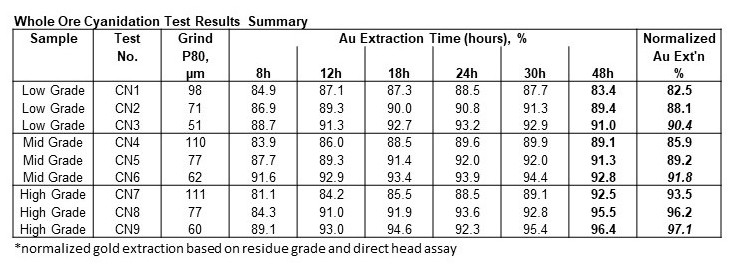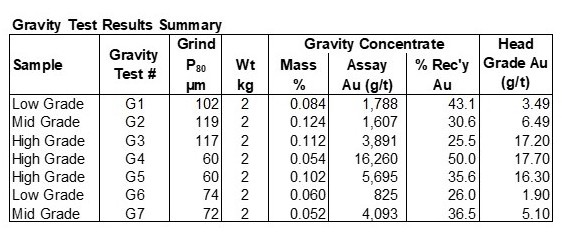Galleon Gold Announces Strong Gold Recoveries in Recent Metallurgical Studies for West Cache Project
TORONTO: August 11, 2021. Galleon Gold Corp. (TSXV: GGO) (the “Company” or “Galleon Gold”) is pleased to announce very favourable results from ongoing metallurgical test work (the “Study”) performed on three composited core-based bulk samples from Zone #9 at its 100% owned West Cache Gold Project, Timmins, Ontario. Three primary processing options for gold recovery have been studied at the SGS Lakefield, Ontario facility: 1) Gravity – Flotation, 2) Whole Ore, and 3) Gravity – Whole Ore. Results from all three processing paths indicate strong gold extractions can be achieved on each of the low (1.77 g/t), mid (5.10 g/t) and high (21.9 g/t) grade portions of the recently identified Zone #9 gold mineralization. Highlights from this work, include:
- Whole Ore Leach: Gold Extraction¹ ranging from 83% to 97% - depending on grind size and composite feed grade
- Gravity – Whole Ore Leach: Gold Extraction¹ of 95% to 97%
- Gravity – Flotation - Concentrate Leach: Gold Extraction¹ of up to 97%
Extraction¹- all references to gold recoveries here are based on gold “extraction” studies. Minor inefficiencies in the overall recovery process from leach solutions will result in small gold losses – this separates gold extraction from gold recovery. These losses can be estimated once all test work has been completed.
Note from the CEO
R. David Russell CEO and President of Galleon Gold comments, “We are very pleased with the recovery rates which indicate Zone #9 gold mineralization can be efficiently recovered using one of three commonly-used industry-standard processing methods. Further metallurgical test work on West Cache bulk samples will help the Company select the most suitable process for toll processing. The recent Study was undertaken in support of the PEA that is currently underway with all three processing methods producing such favourable results, we now have more toll processing options available to us.”
Whole Ore Leach Results:
Whole ore leach, the simplest processing option, follows the crushing, grinding, leaching and recovery of the dissolved gold flowsheet. The following test results show that over 90% of the gold can be extracted in simple tank leach of the whole ore, while remaining insensitive to the gold grades being evaluated.

The Whole Ore Leach process, includes: 1) initial whole ore crushing and grinding, and 2) bottle roll leach using best grind size, standard reagent conditions, and retention time. Significant considerations in using the Whole Ore Leach Method, include:
- Strong overall gold recovery using a simple process
- No gravity circuit needed, thus mitigating an area vulnerable to gold loss
- Modest reagent consumption overall
- Minimal processing equipment requirement
Gravity Work Results:

Gravity Discussion
West Cache Zone #9 mineralization responds well to conventional gravity separation. SGS gravity test work procedures utilized 119 to 60 micron grind sizes passed through and concentrated in a Knelson concentrator prior to being upgraded using a Mozley Separator. The Mozley gravity concentrate was then submitted for gold assay where it was assayed to extinction, while the tailings were combined. Significant considerations for using a gravity recovery step in the process plant, include:
- Gravity recovery was efficient with all 3 composites producing concentrates assaying over 50 oz/t gold
- A significant proportion of fine free gold can be recovered, with the finest gold recovered by leaching
- Leaching of the gravity tails responds well to fine grinding at 60 microns or less to achieve plus 90% recoveries
- Work to date suggests increased overall gold recoveries when using gravity in the process stream
Gravity - Whole Ore Leach Results:

The Gravity – Whole Ore Leach process, includes: 1) optimized initial whole ore crush and grind, 2) gravity recovery producing a fine native gold concentrate, 3) separately process the gravity concentrate and tails, 4) bottle roll leach of gravity tails using moderately fine grind size, standard reagent conditions, and 48-hour retention time. Significant considerations in using the Whole Ore Method, include:
- Excellent overall gold recoveries using relatively simple processing options
- No flotation step required
Gravity – Flotation Concentrate Leach Results:

The Gravity–Flotation Concentrate Leach process, includes: 1) initial whole ore crush and grind, 2) gravity recovery producing a fine native gold concentrate, 3) process the gravity concentrates 4) flotation on the gravity tails to produce a gold-sulphide concentrate, 5) leaching of flotation concentrate following a fine grind optimized to maximize gold extraction. The test results indicate a very efficient recovery of gold from the concentrate so no leaching or treatment of the flotation tails is required. Significant considerations in using the Gravity Flotation Concentrate Leach Flowsheet, include:
- Very high overall extraction and recovery of gold at 96-97%
- Comparable strong extraction of all three grade ranges that can be optimized with a finer grind on less material (flotation concentrate -vs- whole ore)
- High recovery path results in final flotation tails that are very low in gold and clean of sulphides
- The flotation concentrate is about 25% of the original rock mass (25% mass pull into concentrate); this reduced amount results in a smaller leach circuit
- Advantages produced by treatment and disposal of smaller volume of sulfide-rich material
- Potential for further test work to confirm the optimum cleaner Au-sulfide concentrate and optimized reagent scheme
Qualified Persons
The technical content of this news release has been reviewed and approved by West Cache Gold Project Manager Leah Page, P. Geo. (APGNS #217) and West Cache Gold Resource Geologist, Rochelle Collins, P. Geo (PGO #1412), both “Qualified Persons” as defined in National Instrument 43-101 - Standards of Disclosure for Mineral Projects. D. Grant Feasby, P.Eng., of P&E Mining Consultants Inc., an Independent Qualified Person as defined by NI 43-101 has also reviewed and approved the technical content of this news release.
Quality Assurance (QA) / Quality Control (QC)
Quality Control and Assurance procedures and protocols are executed to ensure sampling and analysis of all exploration work is conducted in accordance with best practices. Drill core produced at the West Cache Property is delivered to the Company’s Timmins logging facility by the drill contractor with all logging, cutting, labeling, and bagging completed under supervision of Qualified Geologists. For this study, HQ sized core was initially sawn in half with the half core bagged for metallurgical work at SGS Canada Inc. (SGS) laboratories, while the remaining half core was cut to produce a quarter-core sample that was immediately sent to AGAT Laboratories (AGAT) to obtain gold assays on individual samples. The AGAT gold results were then used by Galleon Gold representatives and SGS metallurgists to produce three sample composites with various grade ranges that best represent a range of locations and rock types throughout Zone #9.
Upon receipt at the SGS Lakefield facility, the samples are weighed, inventoried, and photographed. The samples are then stage-crushed to minus 10 mesh and split into the required charges. A single test charge is randomly selected, from which a smaller 150 gram subsample is selected for chemical characterization, including gold by fire assay, arsenic, whole rock analysis and multi-element ICP work.
For the composites, sample charges were produced for each of the three grade ranges, including: 23 low-grade, 22 mid-grade and 21 high-grade samples. Sample charge weights varied from 1 to 10 Kg. To produce the results reported above using cyanide bottle rolls, three grind sizes were used over a 48 hour retention time, with solution subsamples assayed at 8, 12, 18, 24 and 30 hours. Conditions included 40% solids, a maintained 10.5-11.0 pH, NaCN maintained at 0.5 g/L and a final metallurgical balance. Initial gold grades were based on averaging two gold assays for each composite and results checked against internal standards and blanks.
In addition to the cyanide bottle roll tests for whole ore gold recovery, SGS procedures evaluated grind size, gravity separation work (Knelson/Mozley), extended gravity recoverable gold (E-GRG), multiple environmental studies and tailings solids test work.
The initial quarter-core samples were prepared at AGAT Laboratories in Mississauga, Ontario. Commercially prepared certified reference material (CRM) (aka standards) and blanks were inserted every 10 samples. Additionally, samples are selected at a frequency of one for every 10 samples for duplicate analysis of pulp and coarse reject material. All samples reported have been checked against Company and Lab standards, duplicates, and blanks.
About SGS
SGS is the world’s leading testing, inspection, and certification company. Recognized as the global benchmark for quality and integrity. Its 89,000 employees operate a network of 2,600 offices and laboratories, working together to enable a better, safer and more interconnected world.
About West Cache Gold Project
The West Cache Gold Project is located 13 km west of Timmins Ontario and is serviced by Provincial highway 101 and secondary access roads. It is situated along the Porcupine – Destor Gold Belt, approximately 7 km northeast of Pan American Silver’s Timmins West Mine and 14 km southwest of Newmont’s Hollinger Mine.
About Galleon Gold
Galleon Gold is a North American exploration and development company. Eric Sprott holds approximately 23% of the Company’s outstanding common shares and is also the Company’s partner on the Neal Gold Project in Idaho. A Preliminary Economic Assessment is currently underway for the Company’s flagship project, the West Cache Gold Project, located 13 km from Timmins, Ontario.
For further information:
Galleon Gold
R. David Russell
Chairman and CEO
T. (416) 644-0066
info@galleongold.com
www.galleongold.com
Forward-Looking Statements
Some of the statements contained herein may be forward-looking statements which involve known and unknown risks and uncertainties. Without limitation, statements regarding potential mineralization and resources, exploration results, expectations, plans, and objectives of Galleon Gold are forward-looking statements that involve various risks. The following are important factors that could cause Galleon Gold’s actual results to differ materially from those expressed or implied by such forward-looking statements: changes in the world-wide price of mineral commodities, general market conditions, risks inherent in mineral exploration, risks associated with development, construction and mining operations, the uncertainty of future exploration activities and cash flows, and the uncertainty of access to additional capital. There can be no assurance that forward-looking statements will prove to be accurate as actual results and future events may differ materially from those anticipated in such statements. Galleon Gold undertakes no obligation to update such forward-looking statements if circumstances or management’s estimates or opinions should change. The reader is cautioned not to place undue reliance on such forward-looking statements.
Neither the TSX Venture Exchange nor its Regulation Services Provider (as that term is defined in policies of the TSX Venture Exchange) accepts responsibility for the adequacy or accuracy of this release.
